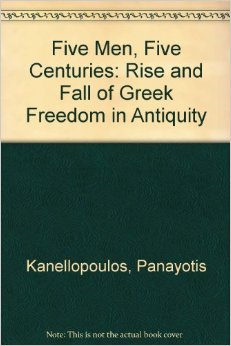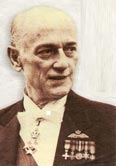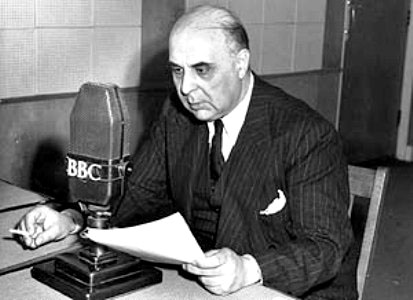For Tassos in America, for his name day
The eight months of my military service left behind a few but really good friends. With one of them I really enjoy discussing about politics. Despite our common roots of morality, he sees the financial crisis in Greece from a totally different angle compared to my approach to it. He is deeply convinced and insists that since the outbreak of the financial crisis in Greece a slightly deepening political polarization has led to a divided society, as the lack of a constructive public debate and the common use of terms such as traitor clearly illustrate. The polarization regards the necessity of reforming/modernizing the state- and market structures. The one pole treats them as necessary, so that creative societal powers can blossom in a space of rule of law . The other one believes that such reforms impose austerity and put forward policies that result in poverty and high rates of unemployment.
The deepening polarization of the society is a parameter of the Greek financial crisis that has attracted my attention and has prompted me to think about the role of citizens within the framework of such a suffocating space. It has reminded me of a law of Solon, an Athenian lawmaker: “when the city is divided, whoever does not take up arms for either of the sides is to be dishonored and is not to have a part in the city”. This law has been thoroughly discussed by Panayiotis Kanellopoulos, a Greek philosopher, sociologist and statesman, in his book “Five men, five centuries”. The analysis of Kanellopoulos follows and is food for thought as the time of the upcoming election in Greece is ‘dangerously’ coming closer and as supporting small or even almost ‘non-existing’ parties seems to be a strategy to by-pass the challenge of choosing between the two in fact myopic and populistic dominant parties.
“…This law has given birth to many thoughts, many doubts. A noble spirit Friedrich Schiller, raised an objection. He certainly understood Solon’s intention, but added that he was mistaken. He wrote: Even this law has behind it a good intention which must not be disregarded. The purpose of the lawgiver was to inspire in his fellow-citizens a warmer interest in the state. He regarded coldness towards the country as the most detestable thing in a citizen. Neutrality can often be a consequence of such coldness. But he forgot that the most consuming interest in the country also often demands this neutrality- when, that is to say, both sides are in the wrong and the country would stand to lose equally from either. Did Solon truly forget this possibility, as Schiller supposes?
 The noble poet was not aware, nor in his days could he have been aware of something that Aristotle says in the Athenian Constitution. Establishing his famous law, Solon’s intention was to punish only those who… stay neutral out of coldness or indifference towards their country, those ‘who through laziness love whatever happens’, who out of indifference- and let me add: out of cunning- leave things to their fate, to ‘whatever happens’, and do not take up position in the ranks of one of the opposing sides. But what must the man who finds that both sides are in the wrong and are harmful to the country do? Must he stay outside?
The noble poet was not aware, nor in his days could he have been aware of something that Aristotle says in the Athenian Constitution. Establishing his famous law, Solon’s intention was to punish only those who… stay neutral out of coldness or indifference towards their country, those ‘who through laziness love whatever happens’, who out of indifference- and let me add: out of cunning- leave things to their fate, to ‘whatever happens’, and do not take up position in the ranks of one of the opposing sides. But what must the man who finds that both sides are in the wrong and are harmful to the country do? Must he stay outside?
 Solon found himself precisely in the position of the person who considers that both sides are in the wrong. Indeed, it would even be more correct to say he considered that those who did wrong were in the wrong, but he also knew that those who had been unjustly treated… would do even greater wrong because of the bitterness that possessed them. And he did not align himself with any side. Many, down to today, have found themselves in a similar position. From the moral point of view it is understandable that a person may not be able to say either yes or no to an appeal that seems like an appeal of history, but is a counterfeit appeal from evil or naive fanatics. What should such a person do if he is a true citizen…? He should do, or try to do, what Solon did. Solon did not remain outside. He went into the arena…”
Solon found himself precisely in the position of the person who considers that both sides are in the wrong. Indeed, it would even be more correct to say he considered that those who did wrong were in the wrong, but he also knew that those who had been unjustly treated… would do even greater wrong because of the bitterness that possessed them. And he did not align himself with any side. Many, down to today, have found themselves in a similar position. From the moral point of view it is understandable that a person may not be able to say either yes or no to an appeal that seems like an appeal of history, but is a counterfeit appeal from evil or naive fanatics. What should such a person do if he is a true citizen…? He should do, or try to do, what Solon did. Solon did not remain outside. He went into the arena…”
“I’m sick of the dusk. Let’s go home, 
let’s go home and turn on the light”
The Last Day, George Seferis
